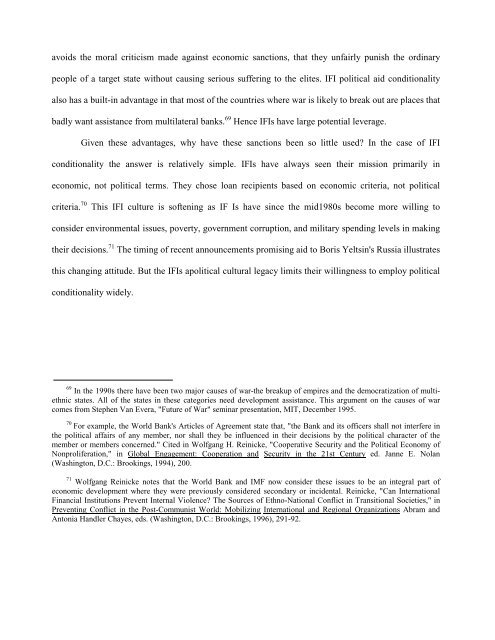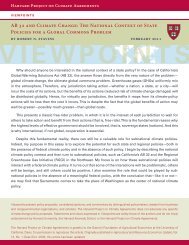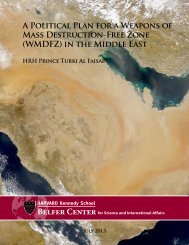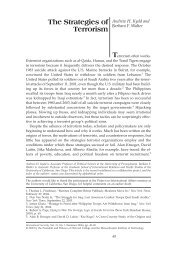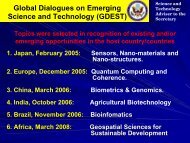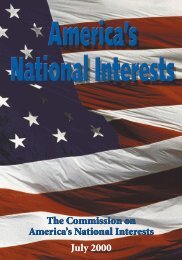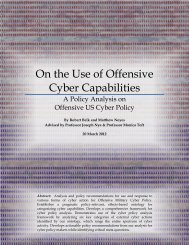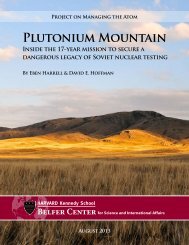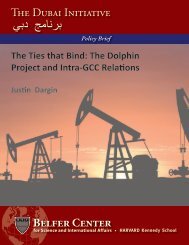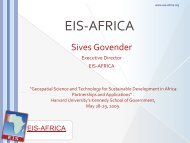Using Economic Sanctions to Prevent Deadly Conflict Elizabeth S ...
Using Economic Sanctions to Prevent Deadly Conflict Elizabeth S ...
Using Economic Sanctions to Prevent Deadly Conflict Elizabeth S ...
You also want an ePaper? Increase the reach of your titles
YUMPU automatically turns print PDFs into web optimized ePapers that Google loves.
avoids the moral criticism made against economic sanctions, that they unfairly punish the ordinarypeople of a target state without causing serious suffering <strong>to</strong> the elites. IFI political aid conditionalityalso has a built-in advantage in that most of the countries where war is likely <strong>to</strong> break out are places thatbadly want assistance from multilateral banks. 69 Hence IFIs have large potential leverage.Given these advantages, why have these sanctions been so little used? In the case of IFIconditionality the answer is relatively simple. IFIs have always seen their mission primarily ineconomic, not political terms. They chose loan recipients based on economic criteria, not politicalcriteria. 70 This IFI culture is softening as IF Is have since the mid1980s become more willing <strong>to</strong>consider environmental issues, poverty, government corruption, and military spending levels in makingtheir decisions. 71 The timing of recent announcements promising aid <strong>to</strong> Boris Yeltsin's Russia illustratesthis changing attitude. But the IFIs apolitical cultural legacy limits their willingness <strong>to</strong> employ politicalconditionality widely.69 In the 1990s there have been two major causes of war-the breakup of empires and the democratization of multiethnicstates. All of the states in these categories need development assistance. This argument on the causes of warcomes from Stephen Van Evera, "Future of War" seminar presentation, MIT, December 1995.70For example, the World Bank's Articles of Agreement state that, "the Bank and its officers shall not interfere inthe political affairs of any member, nor shall they be influenced in their decisions by the political character of themember or members concerned." Cited in Wolfgang H. Reinicke, "Cooperative Security and the Political Economy ofNonproliferation," in Global Engagement: Cooperation and Security in the 21st Century ed. Janne E. Nolan(Washing<strong>to</strong>n, D.C.: Brookings, 1994), 200.71 Wolfgang Reinicke notes that the World Bank and IMF now consider these issues <strong>to</strong> be an integral part ofeconomic development where they were previously considered secondary or incidental. Reinicke, "Can InternationalFinancial Institutions <strong>Prevent</strong> Internal Violence? The Sources of Ethno-National <strong>Conflict</strong> in Transitional Societies," in<strong>Prevent</strong>ing <strong>Conflict</strong> in the Post-Communist World: Mobilizing International and Regional Organizations Abram andAn<strong>to</strong>nia Handler Chayes, eds. (Washing<strong>to</strong>n, D.C.: Brookings, 1996), 291-92.


